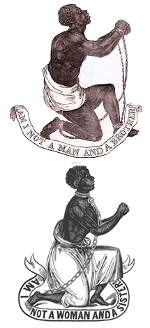Slave Codes in America
At various times, throughout the history of the country until the end of the Civil War, states and even the federal government had laws that countenanced and reinforced the idea that slaves were property and did not have rights as non-slaves did. These laws varied from state to state and went through various cycles of adaptation and repeal. In their entirety, these laws are often referred to as Slave Codes. A part of a South Carolina law put it very succinctly: "The slave, being personal chattel, is at all times liable to be sold absolutely, or mortgaged or leased, at the will of his master." Among the things denied to slaves:
The first North American colony to legalize slavery was Massachusetts, in 1641. Every one of the 13 Colonies eventually had slave laws on the books. New York's were some of the strictest. 
On the other hand, Pennsylvania, in 1688, adopted the first formal resolution against slavery. The colony followed suit nearly a century later with the formation of the Pennsylvania Society for the Abolition of Slavery and had much earlier passed laws restricting the slave trade. Other Northern states eventually followed suit. Some of the harshest laws regarding slavery were in the South. Virginia, in 1662, passed a law saying that a child born to an enslaved woman was a slave as well. The colony passed a series of other restrictive laws:
Among the harshest set of laws was the Virginia Slave Code, instituted in 1705. This served to collect all previous laws regarding conduct involving slaves under one banner and so reiterated some laws passed previously. The Virginia colony–home to the first permanent English settlement in the New World, Jamestown–had been in the habit of encouraging the practice of indentured servitude, whereby workers, both black and white, would enter into a contract with an employer, agreeing to work for a number of years without pay but receiving room and board, and then go free, often with "freedom dues," which were money, clothing, goods, or even title to land. The arrival of the first ship of slaves in 1619 gave plantation owners and other employers another option for workers, one that the owners found increasingly more attractive. With the stroke of a pen, the Virginia Slave Code made slaves of all African-American indentured servants, no matter how few days they had left to serve. 
As well, the 1705 Virginia Slave Act introduced a sliding scale reward for capturing an escaped slave, based on how far away from home the slave was when he or she was found. Rewards were paid in pounds of tobacco, to both the person who did the capturing and the county in which that person lived. Expanding on the initial prohibition of inter-racial marriage, the Virginia Slave Act pronounced jail time for such a practice: punishment was six months in jail, without hope of bail, and a stiff fine on top of that. The Act extended this prohibition to a white person's marrying a Native American. Further, any minister who performed such a marriage ceremony could face a heavy fine for doing so. As a result of this code, slave owners could punish their slaves without fear of legal reprisal. Slaves were property, the theory went, and so damaging one's own property was not a punishable offense. Also in 1705, the Virginia Assembly prohibited free African-Americans from holding public office or from testifying in court cases. Next page > Later States > Page 1, 2 |
|
Social Studies for Kids
copyright 2002–2026
David White





